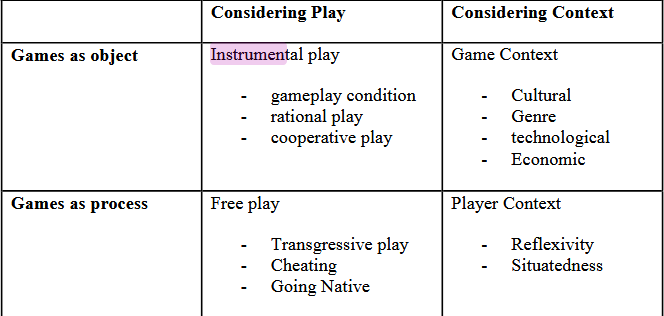As the field of game studies has evolved, so has its methodology. There are different approaches to analyzing a game that a ludologist can employ, which are discussed in an article by Jasper van Vught and René Glas titled Considering play: From method to analysis. Elaborating and building on prior theories, the authors highlight different ways of playing games analytically.
Games as objects vs games as a process
There exist two different schools of thought within ludologists. Those who treat a game as an object and those who treat it as a process. The former assume that a game provides a core structure that encourages or enforces certain play actions to be performed, which then form the “game text” that is discussed and analyzed. Those who treat games as a process factor in the subjectivity of the play experience, meaning that they focus more on how players actually choose to play the game. Scholars who use this methodology might discuss how “a game of Counter Strike” might be amazing by analyzing what happens during an individual round or play session. These varying approaches are also called formalism and situationism, formalism focusing on the formal aspects of the game while situationists study concrete gaming practices and sometimes argue that gaming can’t be studied in the abstract.
Focusing only on the structural elements of a game puts the researcher in the risk of ignoring the fact that play does not always abide by the rules set by a game’s design, while focusing too much on play practices can ignore the meanings embedded in the game by its designers.
A game of Counter Strike.
Instrumental vs free play
Players can let their in-game actions be informed by two different approaches. Following the game’s formal components (such as tutorials) and playing the game as intended is called instrumental play, whilst more unstructured and anarchic player behavior is called free play. Instrumentalism is more aligned with formalism, while free play is with situationism. There exist different subsets within both play types.
One form of instrumental play is exhaustive playing strategy, which means that one should perform all the different actions that a game makes available before making claims about a game as a whole. According to the authors, this strategy is inherently limited to small games and specific research questions.
Heuristic analytical strategies
For instrumentalists seeking to perform actions that lead to success (completion) in a game, the authors specify three different heuristic strategies:
- Gameplay condition: Success can be defined by the ability to keep playing the game, thus every subsequent choice the player makes is based on the desire the keep playing. Works mainly in linear games of progression.
- The rational player: As long as every move is informed by the desire to achieve the game’s objective, one can focus on the way that game structures player behavior to positive and negative reinforcement.
- The cooperative player: Here cooperation occurs between the player and the game, if the player follows the game’s cues to play in “appropriate” manner. It’s argued that unlike the aforementioned two methods, this one lets the player to distinguish between more and less important elements of the game’s narrative and progress (such as between side and main quests).
Free play
Free play, or transgressive play, is intentional rebelling against the “intended way” of playing the game. There exist myriad of different transgressive approaches a researcher can take, but the authors highlights two above all else: cheating and “going native”.
Cheating “allows us to reflect upon the presuppositions that we bring to games”. Going native is a sociological term used to describe concerns with losing objectivity as a result of becoming too involved with a research subject. The authors argue that from a humanities perspective, a more subjective experience “is not just acceptable, but unavoidable”.
Considering context
An important part of ludoliteracy is understanding context. Being ludoliterate means being able to place a game in the context of human culture (including the relation with other media); in the context of other games (including genre); and the context of the technological platform on which games run.
The importance of acknowledge one’s own context as a researcher is stressed as well in the article. As a game’s scholar is “inherently caught up in the object of study”, it is argued that downplaying or obscuring oneself in the context of the study is problematic. Formalists might be more inclined to try and appear objective in their readings of games, while situationists prefer personal tellings of games over the notion that game criticism should be a pursuit of objectivity.

A visualisation from the article
In summary
A fundamental research question in game studies is to choose from what angle to approach a game. Knowing which theoretical framework suits your research question is important in making the play process a more effective and well considered part of one’s research.
Original article: http://digra2017.com/static/Full%20Papers/56_DIGRA2017_FP_Vught_Considering_Play.pdf
You might also like
More from Game Research Highlights
How do you want to do this? – A look into the therapeutic uses of role-playing games
Can playing RPGs contribute positively to your wellbeing? A recent study aims to find out how RPGs are being used …
Eldritch horrors and tentacles – Defining what “Lovecraftian” is in games
H.P. Lovecrafts legacy lives today in the shared world of Cthulhu Mythos and its iconic monsters. Prema Arasu defines the …
Are Souls Games the Contemporary Myths?
Dom Ford’s Approaching FromSoftware’s Souls Games as Myth reveals the Souls series as a modern mythology where gods fall, desires …
















